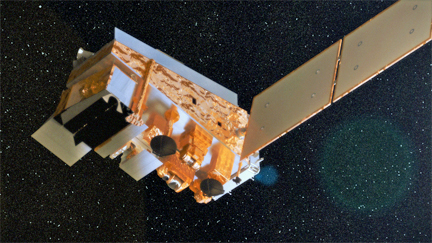
[SatNews] Exelis (NYSE: XLS) has been awarded a contract by NASA worth up to $208 million to build the Radiation Budget Instrument (RBI), a satellite payload that will improve scientific understanding of climate change—the contract includes one flight unit with options for two more instruments and associated support.

Artistic rendition of the Suomi-NPP satellite.
RBI will provide more accurate measurements of reflected sunlight and thermal radiation emitted by Earth than the Clouds and Earth’s Radiant Energy System (CERES) instrument currently flying on the Suomi National Polar-orbiting Partnership satellite. Exelis has a proven track record of performance, expertise and innovation in remote sensing systems, such as RBI, as part of its intelligence, surveillance, reconnaissance and analytics strategic growth platform.Observations from RBI will help measure the effect of clouds on the Earth’s energy balance, which strongly influences both weather and climate. Long-term satellite data from RBI will help scientists and researchers understand the links between the Earth’s incoming and outgoing energy, as well as properties of the atmosphere that affect the energy balance. They will also be used to develop a quantitative understanding of the links between Earth’s radiation budget and the properties of the atmosphere and surface that define that budget.
RBI will be included on the second Joint Polar Satellite System (JPSS) spacecraft, which is planned for launch in 2021. JPSS, a joint NOAA/NASA program, represents several significant technical and scientific advances in environmental monitoring, and will help advance weather, climate, environmental and oceanographic science. Exelis is also building the CrIS instruments for the JPSS program.
“Through advances in technology and calibration techniques, RBI will improve our understanding of clouds and their role in the atmosphere, which is essential for longer-term weather forecasts and improving climate models,” said Eric Webster, vice president of weather systems for Exelis. “RBI data will also play a critically important short-term meteorological role, providing fundamental inputs to weather forecasts of 10 days or longer.”
For further information regarding Exelis, please visit http://www.exelisinc.com/

